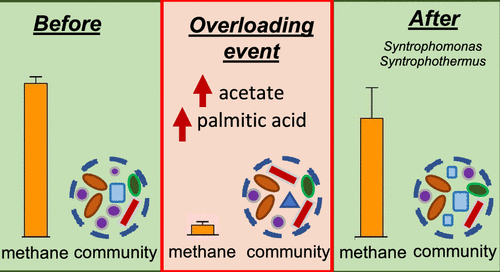当前位置:
X-MOL 学术
›
ACS ES&T Eng.
›
论文详情
Our official English website, www.x-mol.net, welcomes your
feedback! (Note: you will need to create a separate account there.)
Taxonomic and Functional Variations Induced by an Overloading Event in Anaerobic Codigestion of Municipal Wastewater Sludge with Fats, Oils, and Grease
ACS ES&T Engineering ( IF 7.4 ) Pub Date : 2021-06-17 , DOI: 10.1021/acsestengg.1c00086 Jessica A. Deaver 1 , Mehul N. Soni 1 , Karla I. Diviesti 1 , Kevin T. Finneran 1 , Vijay Shankar 2 , Sudeep C. Popat 1
ACS ES&T Engineering ( IF 7.4 ) Pub Date : 2021-06-17 , DOI: 10.1021/acsestengg.1c00086 Jessica A. Deaver 1 , Mehul N. Soni 1 , Karla I. Diviesti 1 , Kevin T. Finneran 1 , Vijay Shankar 2 , Sudeep C. Popat 1
Affiliation

|
This study aimed to elucidate microbial community changes in response to an overloading of fats, oils, and grease (FOG) during anaerobic codigestion with municipal wastewater sludge. Two semicontinuous digesters, one control and one FOG-fed codigester, were operated for over 300 days. Upon establishing a stable function, defined by consistent methane production over several solids retention times (SRT), the FOG codigester was overloaded, resulting in stalled methane production for a duration of approximately three SRTs. An increase in methane production relative to the stalled state characterized recovery following a period of batch operation, and normal function was subsequently maintained over several more SRTs. Time-series long-chain fatty acids (LCFA), volatile fatty acids (VFA), and methane analysis revealed palmitic acid accumulation as a bottleneck during the overloading event. Corresponding time-series metagenomic sequencing revealed changes in microbial community structure and potential function before, during, and after the overloading event and compared to the control digester. Abundance of central metabolism genes and stress response genes varied over time in the codigester compared to the control. Taxonomy and diversity analyses revealed that while the microbial community composition changed over time, the communities before the overloading event and after recovery were more similar to each other than to the community during the overloading event.
中文翻译:

含脂肪、油和油脂的城市污水污泥厌氧共消化过程中过载事件引起的分类学和功能变化
本研究旨在阐明微生物群落的变化,以响应城市污水污泥厌氧共消化过程中脂肪、油和油脂 (FOG) 的超载。两个半连续消化器,一个对照和一个 FOG 饲喂共消化器,运行了 300 多天。在建立稳定函数(定义为在几个固体保留时间 (SRT) 内产生一致的甲烷)后,FOG 共消化器过载,导致甲烷产生停滞约三个 SRT 的持续时间。甲烷产量相对于停滞状态的增加表征了间歇操作时期后的恢复,并且随后在更多的 SRT 中保持了正常功能。时间序列长链脂肪酸 (LCFA)、挥发性脂肪酸 (VFA)、和甲烷分析表明,棕榈酸积累是过载事件期间的瓶颈。相应的时间序列宏基因组测序揭示了超载事件之前、期间和之后微生物群落结构和潜在功能的变化,并与对照消化器进行了比较。与对照相比,codigester 中中央代谢基因和应激反应基因的丰度随时间变化。分类学和多样性分析表明,虽然微生物群落组成随时间变化,但超载事件之前和恢复后的群落彼此之间的相似度高于超载事件期间的群落。在超载事件期间和之后,并与对照消化器进行比较。与对照相比,codigester 中中央代谢基因和应激反应基因的丰度随时间变化。分类学和多样性分析表明,虽然微生物群落组成随时间变化,但超载事件之前和恢复后的群落彼此之间的相似度高于超载事件期间的群落。在超载事件期间和之后,并与对照消化器进行比较。与对照相比,codigester 中中央代谢基因和应激反应基因的丰度随时间变化。分类学和多样性分析表明,虽然微生物群落组成随时间变化,但超载事件之前和恢复后的群落彼此之间的相似度高于超载事件期间的群落。
更新日期:2021-08-13
中文翻译:

含脂肪、油和油脂的城市污水污泥厌氧共消化过程中过载事件引起的分类学和功能变化
本研究旨在阐明微生物群落的变化,以响应城市污水污泥厌氧共消化过程中脂肪、油和油脂 (FOG) 的超载。两个半连续消化器,一个对照和一个 FOG 饲喂共消化器,运行了 300 多天。在建立稳定函数(定义为在几个固体保留时间 (SRT) 内产生一致的甲烷)后,FOG 共消化器过载,导致甲烷产生停滞约三个 SRT 的持续时间。甲烷产量相对于停滞状态的增加表征了间歇操作时期后的恢复,并且随后在更多的 SRT 中保持了正常功能。时间序列长链脂肪酸 (LCFA)、挥发性脂肪酸 (VFA)、和甲烷分析表明,棕榈酸积累是过载事件期间的瓶颈。相应的时间序列宏基因组测序揭示了超载事件之前、期间和之后微生物群落结构和潜在功能的变化,并与对照消化器进行了比较。与对照相比,codigester 中中央代谢基因和应激反应基因的丰度随时间变化。分类学和多样性分析表明,虽然微生物群落组成随时间变化,但超载事件之前和恢复后的群落彼此之间的相似度高于超载事件期间的群落。在超载事件期间和之后,并与对照消化器进行比较。与对照相比,codigester 中中央代谢基因和应激反应基因的丰度随时间变化。分类学和多样性分析表明,虽然微生物群落组成随时间变化,但超载事件之前和恢复后的群落彼此之间的相似度高于超载事件期间的群落。在超载事件期间和之后,并与对照消化器进行比较。与对照相比,codigester 中中央代谢基因和应激反应基因的丰度随时间变化。分类学和多样性分析表明,虽然微生物群落组成随时间变化,但超载事件之前和恢复后的群落彼此之间的相似度高于超载事件期间的群落。











































 京公网安备 11010802027423号
京公网安备 11010802027423号